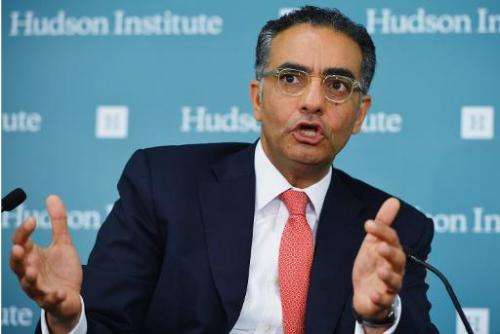Net regulator says push for government control is 'dead'

The head of the Internet regulator says a push from China and Russia for governments to control the web will be "dead on arrival" but that he hopes a consensus will emerge before the US cedes its oversight role.
Fadi Chehade, chief executive of the US-linked Internet Corporation for Assigned Names and Numbers (ICANN), said Washington is committed to hand over the reins only to a diverse group representing business, civil society, academia and governments.
The US Department of Commerce has said it will next year relinquish control over ICANN, which controls Internet website addresses globally, as part of longstanding efforts to privatise the running of the web.
But it warned that if the US deems the replacement oversight model unacceptable, it has the prerogative to continue its stewardship role and renew ICANN's contract for a further four years.
"The US government made it a condition to let go that the replacement is not government-oriented, government-controlled or government-centric," Chehade told AFP on the sidelines of this week's CommunicAsia telecom trade fair in Singapore.
Several countries including China and Russia want ICANN to be supervised by an inter-governmental body, a proposal that critics say will provide a powerful tool to repressive regimes.
Chehade said that a coordinating committee will begin deliberations on the replacement model in July and that if it emerges with a government-dominated concept, "the US will send us back home. It is dead on arrival."
"We know already the cadre of what will be accepted, it has already been set," he said.
Since 1998, ICANN, a Los Angeles-based non-profit group, has controlled domain names like .com and .org under a contract with the US government that expires in September 2015.
Its also houses the Internet Assigned Numbers Authority (IANA), which is responsible for managing the numeric addresses assigned to websites.
Delegates at an international conference held in Brazil in April on how the Internet should be governed also voiced support for a transparent, multi-stakeholder approach.
Critics have said that allowing governments, especially authoritarian regimes, to control the Internet's domain name system would allow states to clamp down on dissent and freedom of expression.

Chehade said that apart from "ideological issues", a United Nations-type body embracing world governments would not work in a fast-changing Internet landscape.
"The UN has not proved to be a very good place today to solve issues that require speed and agility, and to solve issues that require participation for multiple types of stakeholders," he said.
Chehade said that despite the debate, he remained hopeful that countries would come to a consensus on the multi-stakeholder model in time for a smooth transition.
"We will make sure that there are clear processes and clear recourse mechanisms in ICANN so that everyone is under the tent and is heard," he said.
"We have to do it in a thoughtful and non-politicised way that matches the Internet speed and involves all the stakeholders that need to make these decisions."
The issue will be discussed again when ICANN convenes for its 50th meeting in London next week. The last meeting, held in Singapore in March, involved over 2,000 delegates from 150 countries.
Periodic public meetings held in different continents are meant to ensure global participation in ICANN's decision-making.
Chehade said the opening of the Internet to domain names that go far beyond .com, .net, .gov and .edu will also be a major talking point at the London meeting.
More than 100 new gTLDs (generic top-level domains) have cleared hurdles to reach registries, such as .donuts, .lawyer, .dentist, .beer and .fishing.
ICANN expects over 1,300 new names to be cleared in the next few years.
© 2014 AFP



















